1-855-587-8814 pop-up is appointed to trick you
1-855-587-8814 pop-up may always show itself in your browser with the audio message and written message saying "your computer has been blocked. Call 1-855-587-8814 now". Sometimes you may fail to search or navigate normally because this annoyance holds your screen hostage. It is not easy to be with a system warning and you may think about calling (855) 587-8814 for tech support.
No matter how much 1-855-587-8814 pop-up resembles real warnings from the Windows system, it is never a trustworthy one. In fact, this pop-up functions as a tool for cyber crooks to cheat you and other PC users into buying unreadable products and services. Once you call this number for tech service, cyber scammers would just right there waiting to persuade you to buy.
1-855-587-8814 pop-up should never be deemed lightly
1-855-587-8814 pop-up is bundled with an adware or riskware type threat that has installed on your computer stealthily via a third party. With its ability to modify browser settings without permission, this uninvited guest brutally causes browser freezing and screen locking. And such situation can occur on any major browser including Chrome, Firefox, or Edge. Since this ad generator may run interference for the malicious including malware programs or cyber hackers behind the curtain, you may suffer a lot if you give it the chance to linger on your device.
If you are in need of help removing this nuisance, you could try the following removal guide.
Plan A: Remove 1-855-587-8814 pop-up Manually from Windows/Mac OS
Plan A: Remove 1-855-587-8814 pop-up Manually
Step 1. End malicious processes generated by this non-sense
On Windows Computer: Press key combination (Ctrl+Alt+Del) to launch Task Manager
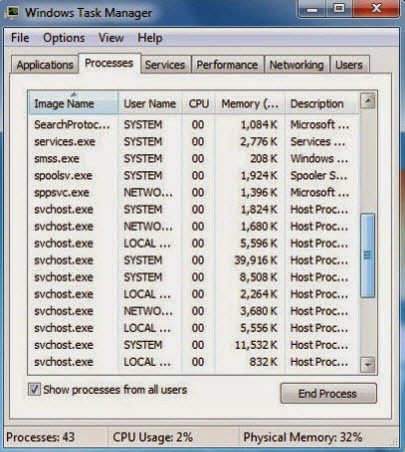
On Mac OS:
Choose Force Quit from the Apple menu, or press key combination (Command + Option + Esc) to open the Force Quit Applications window to do this.
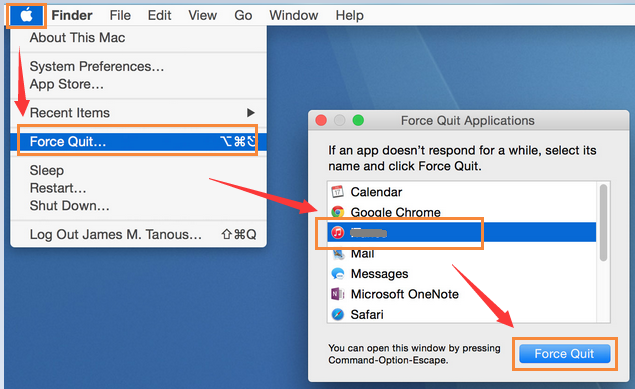
Step 2. Uninstall webpage scam related or unwanted application that bundled with this Ad
On Windows Computer:
Win 7: Go to the “Start” menu, select “Control Panel”. Locate “Programs”. If there is anything related to tech scam related program on the list of your Programs, then select it and uninstall it.
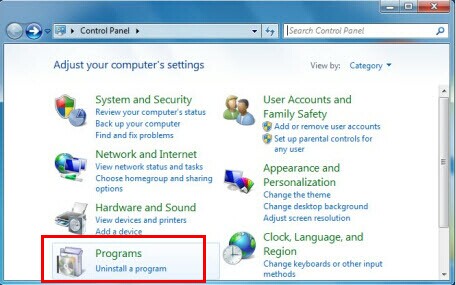
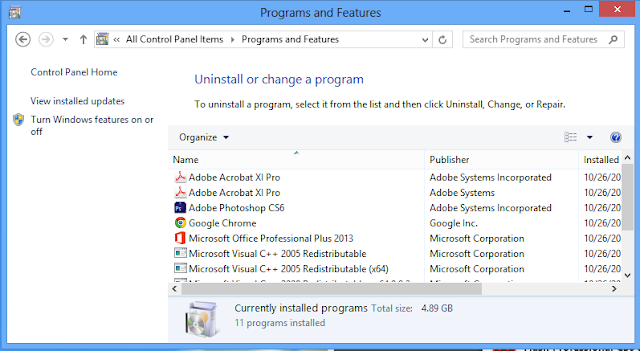
Win 10: Go to the “Start” menu, select “Settings” and then “System”; Click on “Apps & features”, if there is tech scam related item, select and uninstall it.

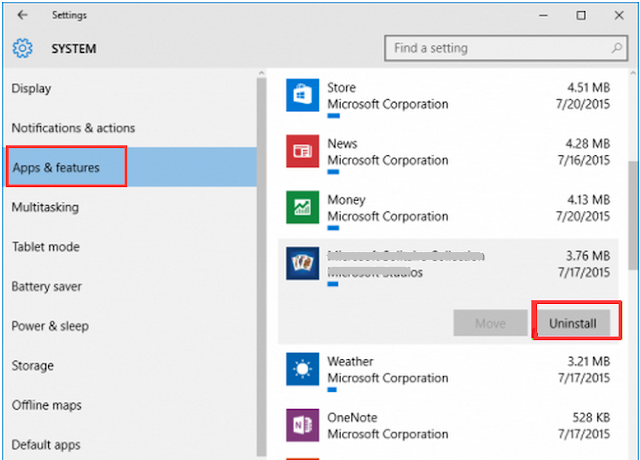
On Mac:
Open the Applications folder in the Finder (or go to the Menu Bar, open the “Go” menu, and select Applications in the list), search for Suspicious application, and then drag it to the Trash (in the dock)
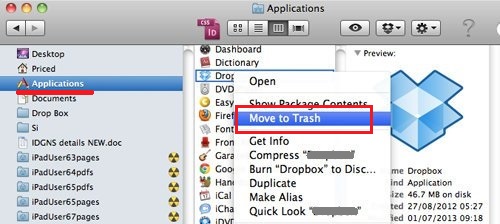
Step 3. Reset your affected browsers one by one
Google Chrome:
Click the Chrome menu on the browser toolbar and select Settings:
a) Scroll down to the bottom of chrome://settings/ page and click Show advanced settings
b) Scroll down to the bottom once again and click Reset Settings

Internet Explorer:
a) Click Start, click Run, in the opened window type "inetcpl.cpl".
b) Click "Advanced" tab, then click Reset.

Mozilla FireFox:
Open Firefox->> choose Help ->>choose Troubleshooting information
a) Click on Reset Firefox. Choose Reset Firefox again to make sure that you want to reset the browser to its initial state.
b) Click Finish button when you get the Import Complete window.
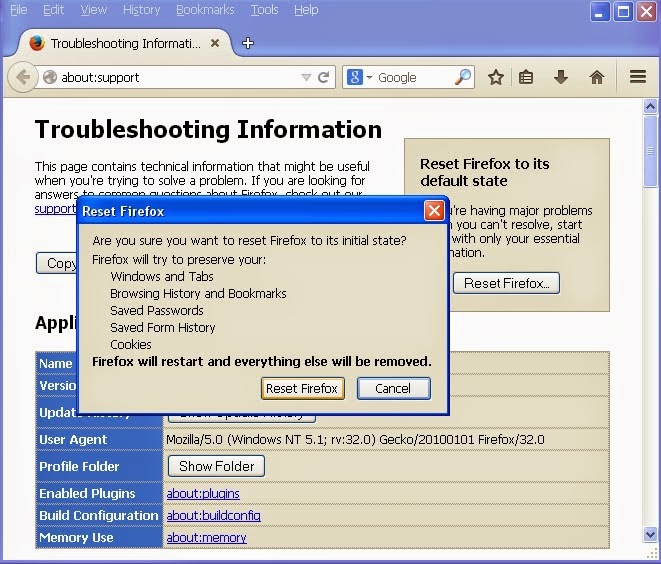
Safari
a) Open your Safari browser from the dock.
b) Click on Safari in your Safari menu at the top of your screen.
c) A drop-down menu will now appear. Choose the option labeled “Reset Safari…”
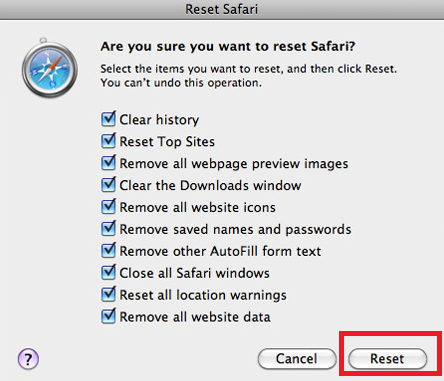
Step 4. Locate junk files and then delete them
On PC: find and delete associated files from C Drive
%ProgramData%\ %CommonProgramFiles%\*.exe %windir%\SeviceProfiles\LocalService\AppData\Local\Temp\random.tlb
On Mac: a) Access hidden Library folder by hold down the Option key while looking at the Go menu in Finder.
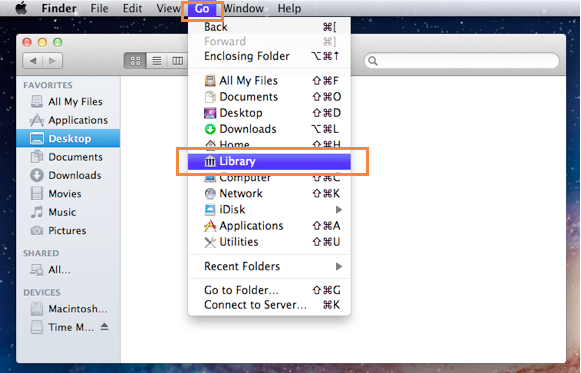
b) Delete related files. You need to check numerous system folders for obscure files such as:
/System/Library/Frameworks/v.framework /System/Library/Frameworks/VSearch.framework /Library/PrivilegedHelperTools/Jack /Library/InputManagers/CTLoader/ ~/Library/Internet Plug-Ins/TroviNPAPIPlugin.plugin /Applications/SearchProtect.app /Applications/InstallMac
(Warning: Care must be given when try this way. Don't empty your Trash until you've determined that everything is working OK, in case you need to restore something you deleted by accident. If you are not skillful enough to finish the above manual removal processes on your own, you could use a recommended malware security suite to help you out with efficiency.)
Plan B: Remove 1-855-587-8814 pop-up Automatically from Your Windows Computer
SpyHunter from Enigma Software Group LLC having been certified by West Coast Labs’ Checkmark Certification System could be a wise choice:
|
Step 1. Click the following icon to download malware removal tool SpyHunter
Follow the on-screen instructions to install SpyHunter


Step 2. Run SpyHunter to scan for this browser hijacker
Click "Start New Scan" button to scan your computer
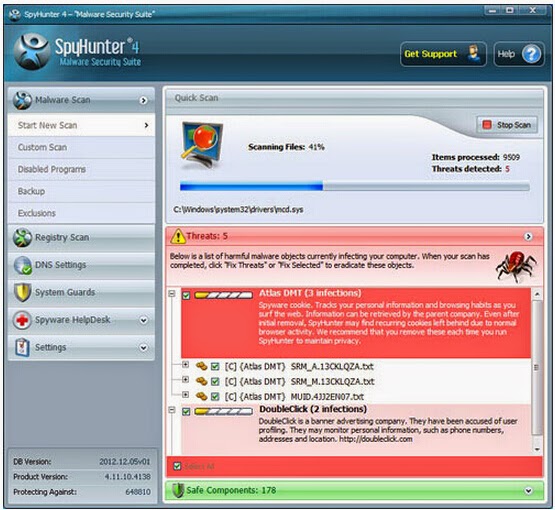
Step 3. Get rid of all detected items by clicking "Fix Threats" button
Plan C: Clean up 1-855-587-8814 pop-up Automatically from Your Mac with MacKeeper
MacKeeper has impressive features:
|
Step 1. Download MacKeeper to your Mac.
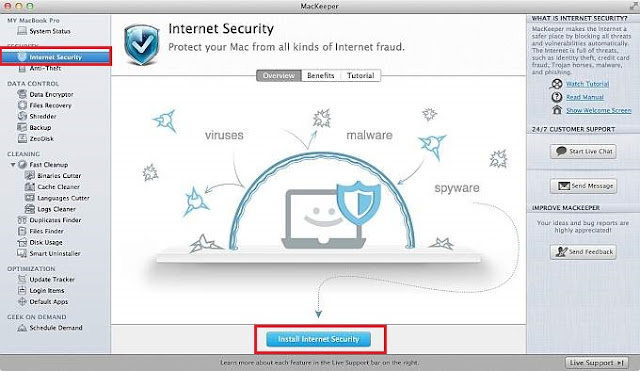
Step 3. Scan your Mac and fix the issue.
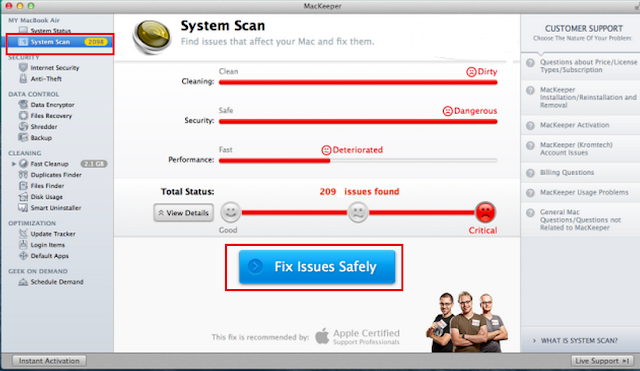
If you have spent lots of time dealing with 1 (855) 587-8814 pop-up but gain no progress, you could feel free to get assistance with SpyHunter (For Win OS) or MacKeeper (For Mac).
(The recommended free scanner is only for malware detection. If it detects the target on your computer, you could think about buying the product and activating the automatic removal function to get rid of the target efficiently!)



No comments:
Post a Comment